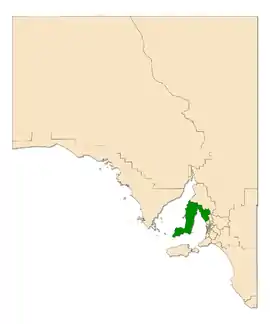Electoral district of Goyder
Goyder was an electoral district of the South Australian House of Assembly. It was a 9,258 km² rural electorate located on the Yorke Peninsula and taking in the towns of Ardrossan, Bute, Edithburgh, Kadina, Maitland, Minlaton, Moonta, Port Wakefield, Wallaroo and Yorketown. The electorate was named after George Goyder, a former state Surveyor-General famous for developing Goyder's Line, which indicated the area of the state that had enough rainfall to be suitable for agriculture.
| Goyder South Australia—House of Assembly | |
|---|---|
 2014 extent of the electoral district of Goyder (green) in South Australia | |
| State | South Australia |
| Created | 1970 |
| Abolished | 2018 |
| Namesake | George Goyder |
| Electors | 24,777 (2014) |
| Area | 9,258 km2 (3,574.5 sq mi) |
| Demographic | Rural |
| Coordinates | 34°34′59″S 137°45′47″E |
From the 2018 election, Goyder was renamed to Narungga.
History
The abolished seat of Yorke Peninsula formed part of the newly created seat of Goyder at the 1970 election. Goyder has been in non-Labor hands for the entire time from its creation at the electoral redistribution of 1969 until it was abolished in 2018. Much of the seat's territory had been represented by non-Labor MPs without interruption since the change to single-member seats in 1938. Even during Labor's landslide victory of 2006, it only managed 40.9 percent of the two-party vote.
However, Goyder had a surprisingly turbulent history. James Ferguson, the last member for Yorke Peninsula, retained Goyder at the 1970 election for the conservative Liberal and Country League. However, former LCL leader and Premier Steele Hall won it for the breakaway Liberal Movement at the 1973 election. Hall resigned in 1974 to run for the Australian Senate at the 1974 federal election, and his seat was successfully held for the Liberal Movement by David Boundy at a 1974 by-election. In 1976, the Liberal Movement merged back into the Liberal Party (the Liberal and Country League having changed its name to that of the federal party after the initial split), and Boundy won Liberal preselection for the seat at the 1977 election. However, Boundy's preselection opponent, Keith Russack, subsequently contested and won the election as an independent Liberal, and was later accepted back into the party. He was succeeded by John Meier at the 1982 election, who subsequently held the seat comfortably for 24 years. Meier retired at the 2006 election and successor candidate Steven Griffiths held the seat on equally comfortable margins. As a measure of the Liberals' strength in the seat, in 2006, the Liberals suffered a swing of over seven percent amid their statewide collapse, but Griffiths still managed to win 59.1 percent of the two-party vote after winning an outright majority on the first count.
Members for Goyder
| Member | Party | Term | |
|---|---|---|---|
| James Ferguson | Liberal and Country | 1970–1973 | |
| Steele Hall | Liberal Movement | 1973–1974 | |
| David Boundy | Liberal Movement | 1974–1976 | |
| Liberal | 1976–1977 | ||
| Keith Russack | Independent Liberal | 1977 | |
| Liberal | 1977–1982 | ||
| John Meier | Liberal | 1982–2006 | |
| Steven Griffiths | Liberal | 2006–2018 | |
Election results
| Party | Candidate | Votes | % | ±% | |
|---|---|---|---|---|---|
| Liberal | Steven Griffiths | 11,968 | 53.7 | −4.5 | |
| Labor | Elyse Ramsay | 6,394 | 28.7 | +1.6 | |
| Family First | John Bennett | 1,633 | 7.3 | +0.1 | |
| Independent | Bob Nicholls | 1,126 | 5.1 | +5.1 | |
| Greens | Graham Smith | 744 | 3.3 | −1.8 | |
| National | Kim McWaters | 416 | 1.9 | +1.9 | |
| Total formal votes | 22,281 | 96.2 | +0.2 | ||
| Informal votes | 878 | 3.8 | −0.2 | ||
| Turnout | 23,159 | 93.5 | −0.3 | ||
| Two-party-preferred result | |||||
| Liberal | Steven Griffiths | 14,022 | 62.9 | −2.8 | |
| Labor | Elyse Ramsay | 8,259 | 37.1 | +2.8 | |
| Liberal hold | Swing | −2.8 | |||